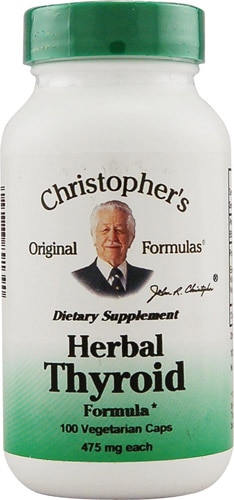[vc_row][vc_column][vc_column_text]From inexplicable mood changes to equally inexplicable weight gain, the symptoms of thyroid problems run the gamut—and may be difficult to separate from other health complications.
As challenging as thyroid issues can be to suss out—especially since some symptoms might mirror symptoms associated with menopause, or the effects of chronic stress—it’s vital to pay close attention to them.
Why?
Because thyroid problems are prevalent. They affect
approximately 20 million Americans, and yet 60 percent of people aren’t aware they even
have an issue. What’s more, thyroid problems hit females disproportionately hard—as in five to eight times more than men. Ultimately, thyroid issues can take a toll on your organs and, well,
life.

But what causes thyroid complications in the first place? How can you figure out if the gradual or sudden health changes you’re enduring are due to the small gland that wraps around your lower neck, and what steps can you take to care for these issues naturally?
Read on as we slide into the subject.
The primary causes of thyroid issues
You may not have given much thought to your thyroid, but trust that it’s working diligently behind the scenes to support several key biological functions.
Shaped like a butterfly, your thyroid gland generates two key hormones:
1) triiodothyronine, or T-3, and
2) thyroxine (T-4)
Both play a crucial role in moderating your metabolism and body temperature, as well as your heartrate, bone health and, for women and assigned female at birth (AFAB), even their periods.
Produce too much of these hormones, and you may have hyperthyroidism; manufacture too little, and you may have hy
pothyroidism. Whichever way your thyroid swings, the causes are as varied as the symptoms that may arrive with these conditions. They include:
Genetics
The Mayo Clinic is one of many experts to confirm that thyroid issues are chiefly caused by genetics—and those who have a family history of thyroid problems are more vulnerable to experiencing the same. Studies featured in the National Library of Medicine affirm this, stating that thyroid diseases are “polygenetic.”
Translation?
The activation and overstimulation of certain genes—
such as the correlation between the presence of HLA-DR3 and Grave’s disease (a form of hyperthyroidism)—ups your risk for developing thyroid issues. Furthermore, the more family members who have thyroid complications, the greater your chances of developing one as well.
Autoimmune disorders
A handful of autoimmune disorders—or diseases in which your immune system inadvertently attacks and harms your body—affect the thyroid.
In the case of
Hashimoto’s Thyroiditis, for example, the systemic inflammation triggered by the immune system’s accidental assault results in damage to the thyroid gland and causes hypothyroidism. This, too, is believed to be a largely inherited disorder, but other conditions including lupus, diabetes, celiac disease and pernicious anemia have been associated with it too.
In addition to Hashimoto’s Thyroiditis and that aforementioned Grave’s disease, other disorders that can strike the thyroid include:
- Painless Thyroiditis
- Subacute Thyroiditis
- Postpartum Thyroiditis
Iodine
True: Many people may be able to consume iodine—or what we know as good, old-fashioned salt—without a hitch. And yet, a subset of individuals who “imbibe” in an excessive amount of it may experience thyroid problems.
It’s important to note here that excessive iodine isn’t simply due to using table salt with a heavy hand: Iodine is also seen in supplements, and also found in cough syrups and select medications.
Radiation exposure
A significant body of research indicates that exposure to radiation has the potential to injure the thyroid gland and, like Hashimoto’s Thyroiditis, precipitate hypothyroidism, as well as thyroid cancer
Environmental factors
The world in which you live and the way you lead your life may also have a hand in the development of thyroid complications. Two of the most common environmental factors that can cause thyroid issues include:
- Smoking: Smoking impairs every part of your body, including your thyroid gland. This is partially due to the fact that tobacco contains cyanide (yes, cyanide), which, when smoked, turns into thiocyanate—a harsh chemical that disrupts hormone production, among other complications. Smoking can not only exacerbate the symptoms of preexisting thyroid disorders but also damage your thyroid gland.
- Environmental toxins: You may be well-aware that BPA, the chemical used to produce plastic products, can wreak havoc on a child’s health. But did you know that it also affects your thyroid gland? (Another reason to invest in a high-quality refillable water bottle.) Other environmental toxins that can spark off thyroid issues include heavy metals, chemical-laden household products, and agricultural agents like pesticides and herbicides.
The symptoms of thyroid issues
With all of this being said, how can you know if you may be, in fact, tussling with a thyroid issue?
This depends on whether the root cause of your thyroid dysfunction is from hyper or hypothyroidism. Let’s look at each.
Hyperthyroidism
The most common signs of hyperthyroidism typically come down to:
- Unintentional weight loss
- Anxiety and nervousness
- Irritability, spinning thoughts, and feeling out of control
- Vision complications
- Muscle weakness
- Heat sensitivity
- Thinning hair
- More frequent bowel movements
- Irregular periods, or the cessation of your period
Hypothyroidism
The symptoms of hypothyroidism, meanwhile, are essentially the antithesis of its sister disorder. These include:
- Unexplained weight gain
- Depression
- Fatigue
- Brain fog
- Cold sensitivity
- Coarse, brittle hair
- Constipation
- Heavy, and more frequent, menstrual periods
The toll of thyroid issues on your health
These symptoms aren’t just uncomfortable: They can pose a real danger to your overall health.
Both hypo and hyperthyroidism impact your blood pressure, thereby affecting your heart: With hypothyroidism, your pulse may be slower than normal; with hyperthyroidism, your heart rate may be revved up. Either can elevate your risk for heart disease—
and heart failure.
Additionally, thyroid issues may:
- Complicate your chances of getting pregnant, or bringing a baby to term
- Engender birth defects
- Lead to the development of goiter
- Cause peripheral neuropathy
In other words? If you suspect a thyroid condition, it’s critical to see your health care professional stat.
How to care for your thyroid naturally
If you’re diagnosed with a thyroid issue, chances are high you will also be put on medication. That said, there are dozens of ways to support your thyroid health—now and as you move through life.
This mostly comes down to how you elect to
live said life.
Prioritizing exercise, coping with stress in effective and meaningful ways and following a health-minded diet (read: one that includes plenty of organic fruits and vegetables, whole grains, beans and lentils, lean proteins, and nuts and seeds) are all surefire methods for enhancing your wellness, period. On this note, you might want to curb your consumption of certain foods, such as
gluten, sugar-free substitutes and
uncooked cruciferous vegetables like cauliflower and Bok choy. (These veggies are certainly rich in nutrients but, eaten raw, may expose to you to goitrogens, which can interfere with your thyroid’s natural function.)
Further, research shows that both
vitamin D and
selenium organically promote thyroid health. Two to try:
Vitacost’s Vitamin D3 Softgels, which naturally encourages immune and nervous system health, and
Vitacost’s Selenium SeLECT—a terrific, potent product that supports the well-being of the thyroid gland.
Above all, heed your body’s cues and act accordingly. Thyroid health
is health, and you have the power to treat yours with care.[/vc_column_text][/vc_column][/vc_row][vc_row][vc_column][vc_text_separator title="Featured Products" border_width="2"][vc_row_inner equal_height="yes" content_placement="middle" gap="35"][vc_column_inner width="1/3"][vc_single_image image="168866" img_size="full" alignment="center" onclick="custom_link" img_link_target="_blank" css=".vc_custom_1695242870680{padding-right: 7% !important;padding-left: 7% !important;}" link="https://www.vitacost.com/vitacost-synergy-thyroid-support-complex-with-l-tyrosine-100-capsules"][/vc_column_inner][vc_column_inner width="1/3"][vc_single_image image="168868" img_size="full" alignment="center" onclick="custom_link" img_link_target="_blank" css=".vc_custom_1695242898411{padding-right: 7% !important;padding-left: 7% !important;}" link="https://www.vitacost.com/gaia-herbs-stress-support-thyroid-support-120-vegan-liquid-phyto-caps"][/vc_column_inner][vc_column_inner width="1/3"][vc_single_image image="168867" img_size="full" alignment="center" onclick="custom_link" img_link_target="_blank" css=".vc_custom_1695242930464{padding-right: 7% !important;padding-left: 7% !important;}" link="https://www.vitacost.com/natural-factors-thyrosense-thyroid-formula"][/vc_column_inner][/vc_row_inner][/vc_column][/vc_row]
 But what causes thyroid complications in the first place? How can you figure out if the gradual or sudden health changes you’re enduring are due to the small gland that wraps around your lower neck, and what steps can you take to care for these issues naturally?
Read on as we slide into the subject.
But what causes thyroid complications in the first place? How can you figure out if the gradual or sudden health changes you’re enduring are due to the small gland that wraps around your lower neck, and what steps can you take to care for these issues naturally?
Read on as we slide into the subject.



